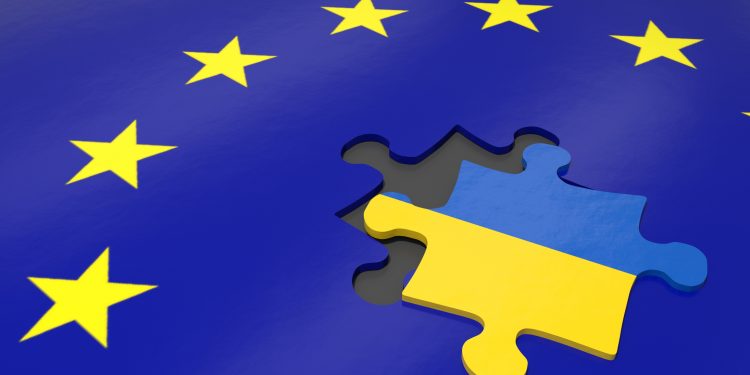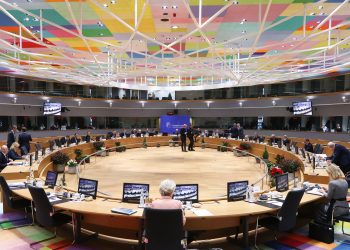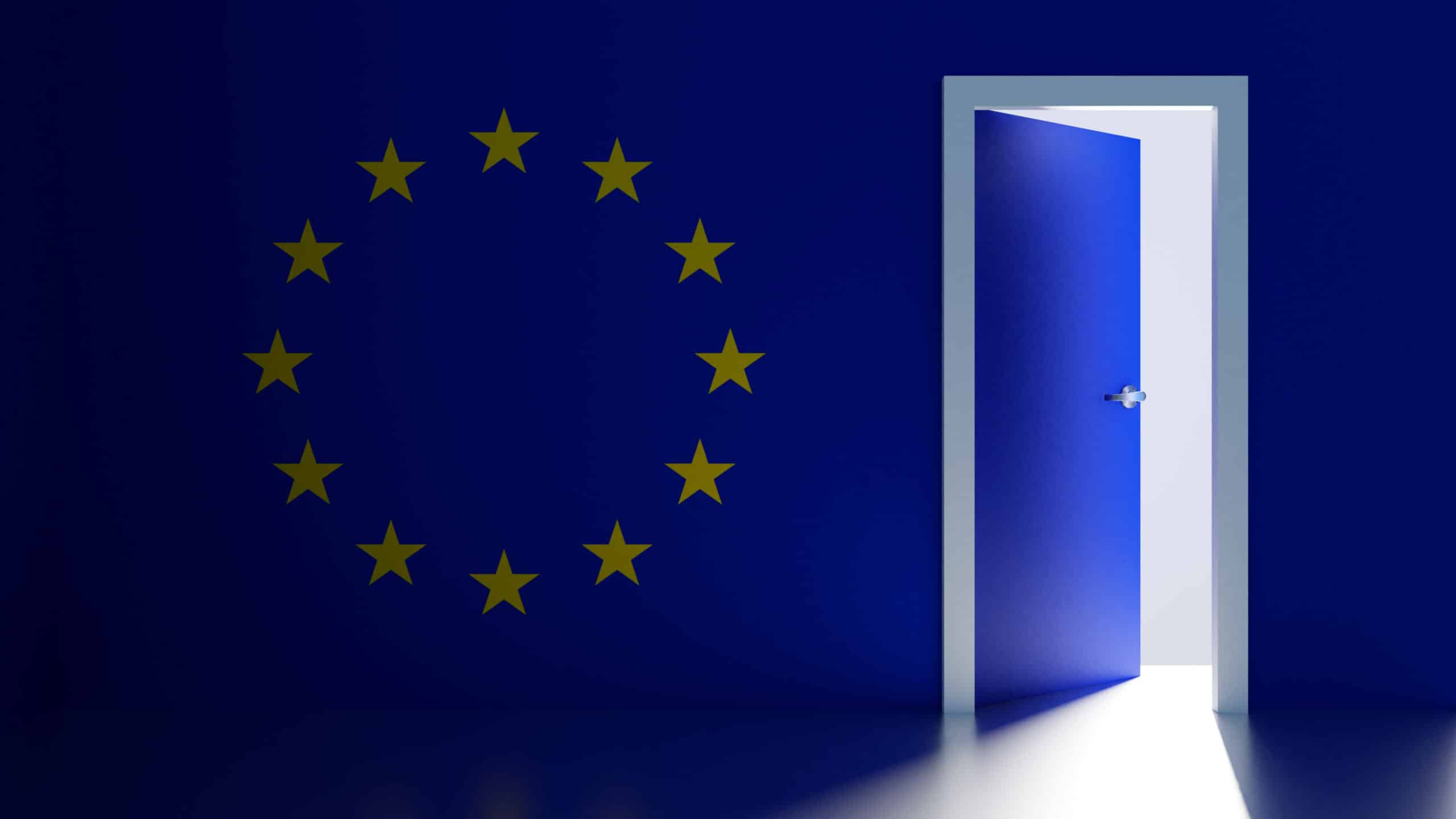Brussels – It is not only a political issue, but, more importantly, it is an issue that affects the future shape of the European Union also in economic and trade terms. For more than a year and a half – ever since Russia started the war of aggression in Ukraine – the EU’s enlargement has returned to the top of the agenda of the 27 Member States, and after the Crucial European Council Dec. 14-15, in which the Union’s leaders decided to start accession negotiations with Ukraine and Moldova (with Bosnia and Herzegovina with reservations) and to grant candidate country status to Georgia, the Italian economic sector has started considering the future risks and opportunities of this process. With a particular focus on the EU enlargement heavyweight, Ukraine.
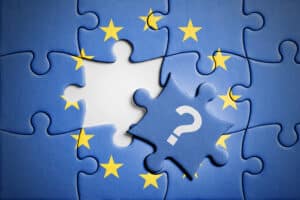 “We hope that countries such as Ukraine and those in the Western Balkans, once they meet the prerequisites and complete the necessary accession, will soon be able to join the European Union,” Confindustria’s President’s Delegate for Europe, Stefan Pan, told Eunews. Confindustria remains cautious about the prospects for EU enlargement, but recognizes the need to “reflect on the future functioning of European institutions, which would already need a change in governance” both in terms of the effectiveness of decision-making processes and to “better respond to the needs of the European system,” Pan said. More specifically, Italian industry looks at how EU enlargement could affect the institutions, European policies, and the budget: “This is why reforms accompanied by in-depth analysis are needed, taking into account all the different aspects involved and making the Union fit to face the challenges of the coming years.”
“We hope that countries such as Ukraine and those in the Western Balkans, once they meet the prerequisites and complete the necessary accession, will soon be able to join the European Union,” Confindustria’s President’s Delegate for Europe, Stefan Pan, told Eunews. Confindustria remains cautious about the prospects for EU enlargement, but recognizes the need to “reflect on the future functioning of European institutions, which would already need a change in governance” both in terms of the effectiveness of decision-making processes and to “better respond to the needs of the European system,” Pan said. More specifically, Italian industry looks at how EU enlargement could affect the institutions, European policies, and the budget: “This is why reforms accompanied by in-depth analysis are needed, taking into account all the different aspects involved and making the Union fit to face the challenges of the coming years.”
The head of Coldiretti’s representative office in Brussels, Paolo Di Stefano, also clarifies that “there are several elements to consider,” from the Internal Market to the EU budget to the timing of negotiations. Above all, Ukraine is in the spotlight, given its size (nearly 44 million inhabitants) and completely different agricultural structure from that of the rest of Europe: “Against an average size of 12/13 hectares of the area occupied by European farms, in Ukraine, it rises to 400 hectares.” As Di Stefano points out to Eunews, Kyiv “will have to adapt to European production standards, such as on food, the environment, and consumer safety,” because an enlarged Europe “can be an opportunity.” For now, however, one cannot ignore the “economic concerns” related to EU enlargement, starting with the Union’s budget: “As shown by the General Secretariat of the Council, under the current budgetary rules, Ukraine’s entry would have a significant impact on the Common Agricultural Policy funds.” There is talk of an “overall reduction of 20 percent for allocations to member states” and “Italy, which is already a net contributor, will have to increase contributions.” In light of these concerns, Coldiretti calls for “important and courageous choices on the EU budget” and negotiations that “do not create too much disruption to the market and the protection of farms in ‘old’ Europe,” Di Stefano said.
MEP Massimiliano Salini (Forza Italia), acting member of the Committee on Industry, Research and Energy (ITRE), sums up the future prospects of EU enlargement for the Italian economy and for the European set-up in a conversation with Eunews. “EU enlargement as such is a positive thing, because it is a sign of the solidity of the European project, but considering Europe’s configuration and its state of health, the Union seems far from ready for a new enlargement.” That is why in the first place “there is no political future without a Constitution, then we need to establish what the EU should deal with at the budgetary level,” and, finally, we can “take action on governance and treaty reform.” Even if this is the political/institutional aspect that affects all 27 Member States, at the national economic level, “there are only benefits for Italy from EU enlargement, as it is an exporting country with brilliant manufacturing.” Salini acknowledged that “some sectors have legitimate concerns, such as agriculture, which needs an evaluation.” However, as a whole, “Italy would only gain” when considering the more countries “to which to sell products without obstacles determined by borders and tariffs: the free movement of goods is certainly a positive thing.”
Where does EU enlargement stand
Of the six Western Balkan countries that have begun the long road to EU membership, accession negotiations have started in four countries – Albania, North Macedonia, Montenegro, and Serbia – one has received candidate status -Bosnia and Herzegovina – and the last has formally applied for and is awaiting the response of the 27 Member States – Kosovo. For Tirana and Skopje, negotiations began in July last year, after waiting eight and 17 years, respectively, while Podgorica and Belgrade have been at this stage for 11 and nine years, respectively. Six years since applying for EU membership, Sarajevo became a candidate to join the Union on December 15, 2022, and the last European Council in December decided that accession negotiations could be opened “once the necessary degree of compliance with the membership criteria has been achieved.” Pristina is in the most complicated position after the formal request sent at the end of last year: since its unilateral declaration of independence from Belgrade in 2008, five EU member states – Cyprus, Greece, Romania, Spain, and Slovakia – continue not to recognize it as a sovereign state.
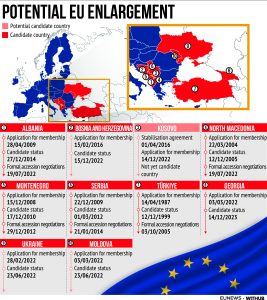 The EU enlargement upheaval began four days after the Russian armed aggression when, in the midst of the war, Ukraine applied for “immediate” membership in the Union, with the application signed on February 28, 2022, by President Zelensky. Georgia and Moldova followed three days later (March 3) to prove that the process of rapprochement with Brussels was irreversible, in an explicit reaction to the risk of seeing their independence erased by Moscow. On June 23, 2022, European Council approved the line drawn by the Commission in its recommendation: Kyiv and Chișinău became the sixth and seventh candidates for EU membership, while Tbilisi was recognized as having a European perspective in the EU enlargement process. In line with the EU Enlargement Package recommendation, the December 14-15 summit of EU leaders decided to start accession negotiations with Ukraine and Moldova and grant Georgia candidate status.
The EU enlargement upheaval began four days after the Russian armed aggression when, in the midst of the war, Ukraine applied for “immediate” membership in the Union, with the application signed on February 28, 2022, by President Zelensky. Georgia and Moldova followed three days later (March 3) to prove that the process of rapprochement with Brussels was irreversible, in an explicit reaction to the risk of seeing their independence erased by Moscow. On June 23, 2022, European Council approved the line drawn by the Commission in its recommendation: Kyiv and Chișinău became the sixth and seventh candidates for EU membership, while Tbilisi was recognized as having a European perspective in the EU enlargement process. In line with the EU Enlargement Package recommendation, the December 14-15 summit of EU leaders decided to start accession negotiations with Ukraine and Moldova and grant Georgia candidate status.
On the other hand, negotiations for Turkey‘s accession to the European Union, which began in 2005, have been frozen since 2018 due to backward steps on democracy, the rule of law, fundamental rights, and the independence of the judiciary. The chapter on Turkey included in the latest annual Enlargement Package presented in October 2022, explicitly states that the country “does not reverse its course and continues to move away from EU positions on the rule of law, increasing tensions over border respect in the Eastern Mediterranean.” At the NATO summit in Vilnius at the end of June, Turkish President Recep Tayyip Erdoğan tried to force his hand, threatening to bind Sweden’s membership in the Atlantic Alliance to when Brussels opens Turkey’s path back to the EU. The blackmail failed, but an ad hoc report at a special meeting in Brussels addressed the dossier on Ankara.
English version by the Translation Service of Withub